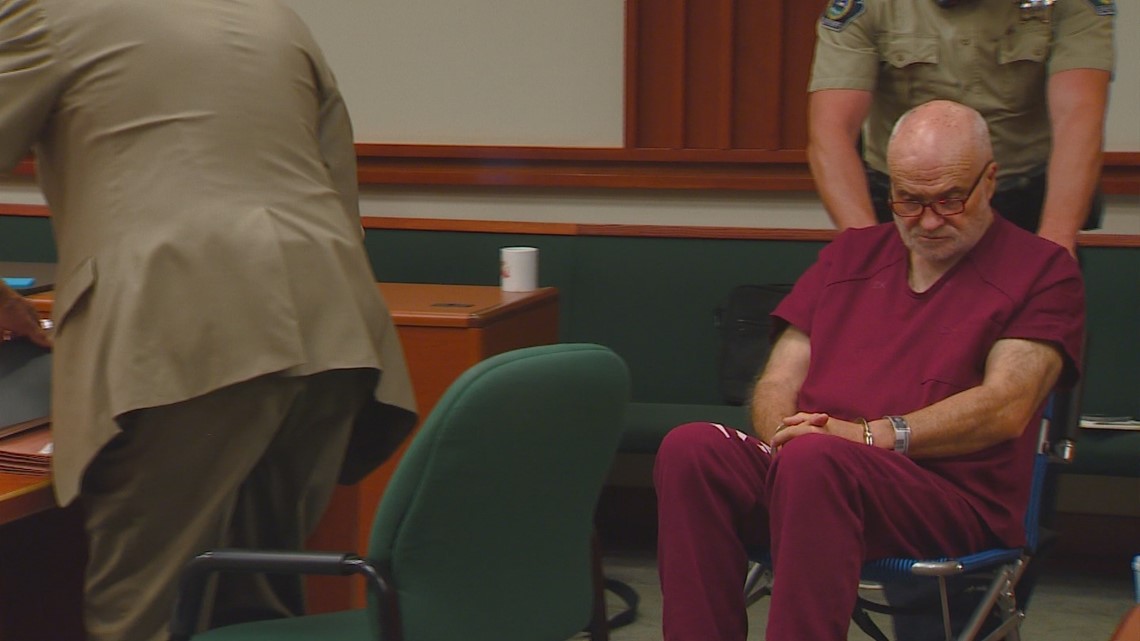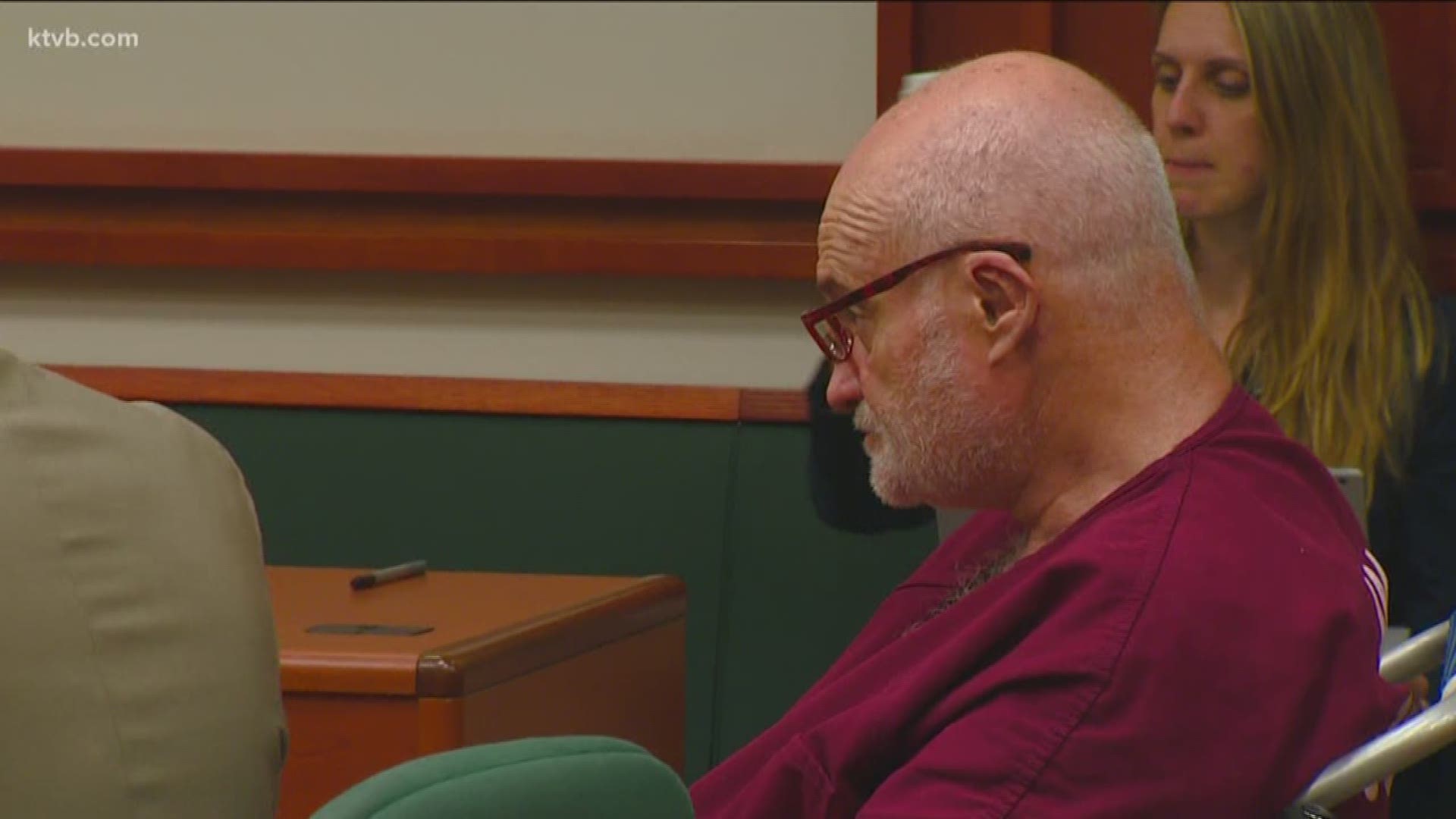BOISE, Idaho — An Eagle man accused of keeping his mother's body hidden in his garage while he continued to pocket her monthly benefits told his ex-wife he was trying to come up with a plan for once investigators discovered the elderly woman was dead.
"I've got to look at limiting my liability by what they don't know," 65-year-old William "Randy" Rhoton says in the call, which was recorded by detectives. "Are they going to figure out that she has passed? Yes. Do they have to know when she passed? No."
That recorded call, which Rhoton made June 20, 2019 to his former wife in Arizona, was played during a preliminary hearing Wednesday in which prosecutors and a dozen witnesses laid out the case against Rhoton.
The suspect, a former therapist, is charged with grand theft, failure to notify of a death, forgery and concealment of evidence. He is not accused of killing Barbara Rhoton, who was in her 90's and reportedly suffering from dementia when she died. But detectives with the Ada County Sheriff's Office say he hid the fact that his mother had died from officials and from his own increasingly-worried family members, all the while allowing her pension and Social Security checks to be deposited into a bank account that he controlled.


In the June call with his ex-wife, Rhoton tells her that Barbara had died in the fall of 2018, although he later insinuated the actual date might be earlier.
Instead of calling a funeral home, he said, he wrapped her in plastic and moved to conceal her remains in his expansive Eagle home, placing her inside a garage bathroom.
"I wrapped her up very carefully in her temple clothes," Rhoton said. "I put her out there nicely, very nicely, and I go out there and talk to her. I'm just not in a good place."
Investigators were closing in. Two days before the recorded call, detectives with the Office of the Inspector General and the Ada County Sheriff's Office had knocked on his door, asking Rhoton for some sort of proof that his mother was still alive.
ACSO Det. Cherie Tucker said Rhoton told them Barbara was visiting friends in another state. His mother was incontinent, barely able to get around, and had advanced memory problems - to the point where he was the only person she could still recognize, he told the detectives.
Tucker testified they asked him to set up a FaceTime call with his mother, but he would not. Rhoton did agree to show the detectives the room where his mother had been living - a spare bedroom with almost no personal items, save for some men's shirts and blazers laid out across the bed.
"The more we pushed for information, or to talk to her or the people who cared for her, he just was very resistant to that," Tucker testified.
As the interview continued, Rhoton became more and more agitated, Tucker said, warning them he was "a man of considerable assets" and had powerful friends.
"At one point he made a comment about how he could bury this thing for years, or he could play this cat-and-mouse game - referring to Barbara's whereabouts," she said.
Rhoton was more worried than he let on. He told his ex-wife in the call that he knew he would likely be caught for pocketing a dead woman's benefits - possibly even sentenced to prison. But he had bigger concerns: Namely, being charged with murder in the case if detectives became convinced his mother had met a violent end.
"That's too deep of water," he said. "I'm not going down on a murder rap of someone I dearly loved. That's insane."
As insurance against a homicide charge, Rhoton said, he had moved his mother's body out of the garage bathroom, placing it inside a maroon SUV that he parked in a farmer's field off Ballantyne Lane about six blocks from his home.
"If they don't have the body, they can't put it on me," Rhoton said. But if he did end up charged with murder, he added, he could just produce his mother's body and hand it over to the authorities.
In the recording, Rhoton goes on to muse that investigators may be able to figure out when his mother's death happened, based on her state of decomposition, which he called "extensive."
"Before I put her in the bag, she was wrapped in that heavy clear construction plastic, so I could see the decomposition taking place, which was not - I've just been in hell for the last year and a half," he said.
The Ada County Coroner's Office has not been able to conclusively determine when she died.
RELATED: Eagle man arrested for not telling police his mother died after her body was found in an SUV
Dr. Garth Warren, a forensic pathologist with the coroner's office, said the woman had been dead anywhere from several months to several years.
Barbara's body had been dressed a white robe and a shroud, then wrapped tightly with a clear plastic sheet, similar to cling wrap, he testified. Her wrists were bound together by strips of the same material.
The remains had next been wrapped in a clear tarp sealed in duct tape "from head to toe," then placed into a hermetically-sealed body bag, according to Warren.
A trash bag found in the SUV alongside the woman's body contained wet paper towels, a bottle of cleaning solution, boxes of baking soda, packaging for shoe guards and a hooded coverall, along with a white T-shirt with Barbara's blood on it.
Warren testified that Barbara's cause of death was something called a basilar subarachnoid hemorrhage, which causes blood to pool at the base of the brain.
That type of hemorrhage can occur naturally through a ruptured aneurysm, or less commonly as a result of trauma, particularly a hyperextension or rotational injury, Warren testified.
Because of how badly decomposed Barbara's remains were at the time of the autopsy, he said, he was unable to determine whether her hemorrhage happened naturally or through trauma. As a result, he ruled the woman's cause of death as "undetermined."
"I can't completely rule out trauma," he said. "If I was convinced it was natural, I would have called it natural."
Rhoton's family members suspect Barbara may have been dead as early as 2016 - the last time anyone else saw her alive or spoke to her over the phone.
Nathan Rhoton, the suspect's son, testified that Barbara and William Rhoton had a contentious relationship even before she moved with him to the Boise area in 2012.
"They had a horribly abusive relationship. Physically, verbally, and she often would ask me to help her get out of there," he said. "It was the nature of their relationship from the time I can remember, since I was born."
He recounted one fight, when he was in sixth grade, in which Barbara broke a plate over her son's head, and Rhoton threw her from her bed.
Nathan Rhoton said he was able to speak to his grandmother on the phone, or heard her in the background of phone calls with his father, until about March of 2016.
That's around the same time his father started making excuses about where Barbara was, and why she could not speak with anyone, he testified. Angela DeMarse, the suspect's daughter, said he alternatively told her that Barbara was in a memory care unit, was living in a condo with round-the-clock care, or had been so swallowed up by her dementia that she would not recognize her granddaughter, and would be upset by a visit or phone call.
After she and Nathan Rhoton traveled to Boise to visit Rhoton after he suffered a heart attack in January 2019, DeMarse said her father still refused to let her see her grandmother or even tell her where Barbara was staying.
DeMarse and her brother searched through Rhoton's home while he was in the hospital, but found no sign of the elderly woman. DeMarse testified they even tried the door to the garage bathroom, but found it locked.
Later, after she returned to her home in Arizona, she confronted Rhoton.
"I said, 'I don't know what your plan is or what's going on, but this is not right.' And he got really mad at me," DeMarse said. "He told me his legal team would come after me and he was going to serve me orders of protection."
She called adult protective services, but nothing came of their investigation, she said. It was not until June 20 - the same day he was arrested - that Rhoton called and admitted that Barbara was dead, she said.
"I just keep thinking how senseless this all is. It didn't have to happen," DeMarse said. "I said, 'did you really need the money that bad?' and he said 'no, I just couldn't let go of her.'"
In the recorded phone call to his ex-wife, Rhoton said his physical ailments played into his failure to report his mother's death. Barbara died after his fall from a ladder in Christmas Eve that left him with a traumatic brain injury and ongoing memory problems, and before a January 2019 heart attack that required a triple bypass, he said.
"If none of this would have happened, she would have passed, I would have called the funeral place, they would have taken her away, and that would have been the end of it," Rhoton said. "We sure as hell didn't need the damn money."
But if he didn't need the money, prosecutors argued, he certainly didn't make any efforts to stop it coming - even going so far as to forge his mother's name on a $110 check.
Rhoton himself indicated Barbara received about $3,700 each month between the Social Security check and pension payout from New York Life that was automatically deposited into a joint account for him and his mother.
Even after both agencies began sending out letters seeking to get in contact with Barbara and verify she was still alive, Rhoton continued to represent that she was living.
"She has not passed away," he told a New York Life representative in a recorded phone call on June 17. "She is alive."
He was arrested three days later.
Rhoton's attorney, Mark Manweiler, argued that the Idaho statute about failing to report a death was vague enough that Rhoton was under no obligation to tell anyone his mother had died if it was from natural causes.
"Everyone, if they live long enough, will die of natural causes," he said. "There's nothing suspicious about it."
He also argued that Nathan Rhoton's testimony about his the suspect's violent relationship with Barbara should be disregarded, pointing to a greeting card Nathan had once sent his father, in which he praises Rhoton's devotion to taking care of the elderly woman.
Judge Daniel Steckel wasn't convinced, and ordered the case bound over to district level. Rhoton is due back in court Oct. 11.

